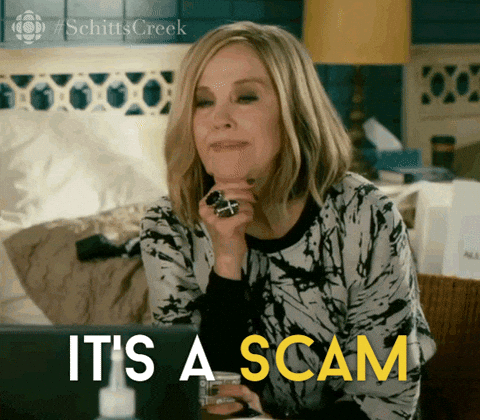Hide Yo’ Kids. Hide Yo’ Wife.
How to Protect Yourself (and Your Brand) from the Rising Tide of Trademark Scams | I Am What an Intellectual Property Attorney Looks Like.
Hey Fam,
Let me tell you a story.
It started with a panicked DM:
“Hey Ruky, I just got a letter saying my trademark was about to expire unless I paid them $2875 immediately. Is this real?!”
Short answer? Nope. Not even close.
Long answer? Unfortunately, trademark scams are becoming way more common — and way more sophisticated.
Whether it’s a suspicious email, an official-looking letter, or a random call claiming you’ll “lose your rights” if you don’t act right now, I’ve seen too many good entrepreneurs fall into the trap.
Some only lost a few hundred dollars. Others had their entire filing delayed, putting their IP and brand protection at risk.
So today, we’re gonna talk about it.
Because your brand deserves better.
And because knowledge is protection.
Loving This Post?
Show us some love by adding a “❤️” or commenting below; this will make our hearts sing.
But First, Church Announcements
Upcoming Event: Trademark Watch Services 101
We’re covering how to monitor your mark, send effective cease & desists, and protect your brand—even on a budget. Don’t miss it.
Date: Thursday, May 29, 2025
Time: 7:30 AM PST
Where: Live on Zoom
We’re covering:
Why ongoing trademark monitoring is critical
How to send an effective cease & desist
Ways to police your brand even on a tight budget
Join us and get practical tools to stay in control of your brand’s reputation and legal protection.
Free for clients, $10.00 for guests.
Clients, a separate email is coming your way shortly.
For guests, reserve your spot here: FFTC Events
Trademark scams are fraudulent messages — often emails or letters — designed to look like they’re from the United States Patent and Trademark Office (USPTO) or a legal service provider.
Their goal?
To trick you into paying unnecessary fees or handing over sensitive information.
These scams prey on fear, urgency, and unfamiliarity with the legal process.
And let’s be honest: when you're juggling 80 other tasks as a founder, it’s easy to mistake a scam for the real thing.
So here’s your founder-friendly guide to spotting the red flags and staying protected.
1. Pressure to Act Immediately
Scammers love fake urgency.
Ughhh, so dramatic…
If the message says you’ll “lose everything” unless you act now?
That’s a red flag.
The USPTO doesn’t operate on being over the top.
If the letter, voicemail, or email starts off sounding like a doomsday clock (“Respond within 24 hours!”), that’s your first clue something’s off.
The USPTO does not operate this way.
Real trademark correspondence is methodical, measured, and never built around threats or panic-inducing language.
Indeed, even if an informal communication, which sometimes happens if the USPTO just wants to check an item off its list, you usually are given a more formal communication with about three months to respond if the USPTO doesn’t get ahold of you.
If a message leads with fear, hit pause—not “purchase.”
2. Unsolicited Communications
Think about this: When was the last time a real government agency cold-called you?
Never? Exactly.
I promise, the USPTO is not exception to that rule.
Scammers know how to impersonate authority.
They’ll spoof email addresses, use intimidating subject lines (“Final Trademark Notice” or “Legal Trademark Warning”), and even mimic USPTO letterhead. You might get:
→ A random phone call from someone claiming to “represent” the USPTO.
→ An email from a domain like “@usptotrademarkoffice.com” (hint: not real).
→ A mailed letter that looks official, but has no connection to your attorney or your case.
These are not just one-off occurrences—they’re part of an entire industry of trademark scammers banking on the fact that most founders are too overwhelmed or unfamiliar with the legal process to double-check.
The fix?
If you didn’t initiate the conversation, don’t engage. Forward it to your attorney or call the USPTO directly at their verified number.
Better to pause than pay.
3. Demands for Payment You Don’t Recognize
Here’s where scammers play their strongest hand—fear + urgency = $$$ for them.
These letters often include:
→ Payment “instructions” via wire transfer, check, or even crypto.
→ Invoices for services like “global trademark watch” or “WIPO registration” you never signed up for.
→ Official-looking seals or “case numbers” that mean absolutely nothing.
The worst part? They often show up just weeks after your trademark application is filed—when your name is now public record and scammers know you’re vulnerable.
**** Oh yeah, if you file your own trademark without an attorney, your information (like your address, email address, or phone number) becomes public record.****
Real trademark demands for payment never arrive in your inbox like a bill from a stranger.
If you didn’t authorize the service—and it didn’t come from the USPTO.gov portal or your trusted counsel—it’s likely not legit.
4. Typographical + Grammatical Errors
Scam communications almost always give themselves away with one thing: sloppiness.
Sure, some are slick. But most are riddled with:
→ Run-on sentences
→ Misused legal terms
→ Over-capitalized words like “TRADEMARK OFFICE LEGAL DEPARTMENT”
→ Logos that look…off
Here’s the rule: If it reads like a bad high school essay written by AI, it’s probably fake.
Why it matters:
Trademark law is precise.
If an organization claiming to handle your intellectual property can’t get basic grammar right, do you really think they’re handling your case professionally?
Don’t risk it.
Here are three things you can do right now to safeguard your trademark and your peace of mind:
If something feels off, don’t just panic—pause.
Head over to the USPTO’s official site or contact your trademark attorney.
If you feel something is a scam, hit us up.
Most scams fall apart with even a little scrutiny by an established professional.
Forward suspicious messages to TMScams@uspto.gov.
Reporting helps the USPTO warn others and take action against repeat offenders.
If it feels scammy, it probably is.
And if you’ve ever second-guessed yourself because you’re “not a lawyer,” don’t worry—you don’t have to be one, you can simply reach out to attorneys at Firm for the Culture.
You just need to be aware and equipped.
Scammers are counting on your fear.
They’re counting on the overwhelm that comes with building a brand.
They’re counting on you being too busy or too unsure to double-check.
But you are not here to build something incredible only to have it hijacked by a scam.
You’re here to play smart. To lead boldly. To protect your work and your legacy.
And I’m here to help you do that every step of the way.
Have you ever been targeted by a trademark scam? What tipped you off?
Drop a comment below or share this with someone who needs the heads-up.
Need Help Protecting Your Creativity?
If you are unsure—or if you know you need to take action—reach out to us.
We have helped countless founders and creatives safeguard their intellectual property, and we would love to do the same for you.
If you need further guidance, reach out to me and my team at Firm for the Culture.
We’re here to help you navigate the copyright, trademark, and thought leadership journey.
Can’t wait to help you protect your dynamic impact.
And #ThatsAWrap
The Doors of the Church Firm Are Open
Thanks for reading.
See you next time.



















